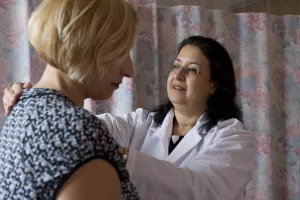Movement disorders are neurological conditions caused by brain or spinal cord injury, underlying autoimmune diseases and genetic disorders. We use the latest and most promising therapies to help you manage your symptoms and regain control of your body.
Moving forward with a movement disorder
Over 40 million Americans have movement disorders caused by more than 30 neurological conditions.
Depending on the type of disorder, muscles may move fast or slow, repetitively, voluntarily or involuntarily.
Although there's no cure for many movement disorders, there are promising treatments that can help manage symptoms.
Whatever type of movement disorder you have, know that we'll answer your questions, address your concerns and provide compassionate care.

Conditions
There are several types of movement disorders that may have overlapping symptoms. Know that you can turn to our expert care team for the following disorders:
- Parkinson's disease
- Dystonia, including essential tremor dystonias
- Gait disorders
- Huntington's disease
Common symptoms
Symptoms may be mild or more advanced, depending on many factors, including your type of disorder and how progressive it is.
The quicker you recognize symptoms and get diagnosed, the faster you can get treatment to slow the progression of your disorder.
Symptoms may include:
- Balance issues
- Difficulty swallowing, writing and speaking
- Muscle twitches
- Problems with coordination
- Shaking
- Spasms
- Tremors
Testing
Your doctor may need to do multiple tests to diagnose your movement disorder because similar symptoms are common among these disorders.
In addition to physical and neurological exams, you may have other tests such as:
- Blood tests
- Computerized tomography (CT) scan
- Electroencephalogram (EEG)
- Electromyography (EMG)
- Lumbar puncture (commonly known as a spinal tap)
- Muscle biopsy
- Magnetic resonance imaging (MRI)
- Nerve conduction study
- Positron emission tomography (PET) scan
Treatments
Our priority is to keep you moving by creating a personalized treatment plan that considers your unique needs.
We use cutting-edge therapies to help you improve your ability to walk and talk, increase balance and coordination and strengthen muscles such as:
- Physical therapy
- Occupational therapy
- Speech therapy
- Psychotherapy
- Deep brain stimulation
- Botox injections
- Mobility aids (such as canes, walkers, and wheelchairs)
Additionally, you may be able to participate in clinical trials involving promising new therapies.

From regular office visits to inpatient stays, find the healthcare you need and deserve close to home.

Meet the doctors and care team devoted to supporting you every step of the way along your path to better health.